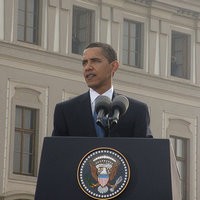As President Barack Obama’s first term in office draws to a close, attention has naturally turned to assessing his foreign policy record over the past four years. And while partisan debates in the run-up to November’s election are certain to feature more caricature than reasoned argument, even nonpartisan observers diverge when it comes to Obama’s foreign policy legacy to date, as recent articles by George Packer, Conor Friedersdorf and Daniel Larison demonstrate.
The challenge is less identifying Obama’s successes and failures than determining the costs of the trade-offs he has made. Broadly speaking, the Obama team’s clearest policy successes have been the disengagement from Iraq and its sophisticated approach to China’s rise and Asia more broadly, where it has consolidated the institutionalization of U.S.-China consultations begun under the Bush administration, while shoring up regional relationships on a bilateral and multilateral level. In Africa, too, the administration has contributed significantly to regional security, if often indirectly and to the detriment of the democracy and governance agenda it initially highlighted.
Obama’s biggest failure has been his high-profile attempt to jumpstart Israel-Palestine final status negotiations. The administration’s response to the Honduras coup showed a similar penchant for finding a policy line that alienates all sides.

